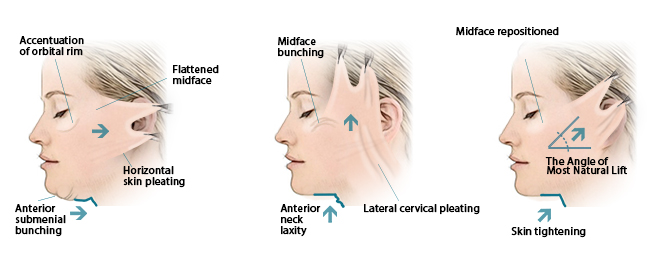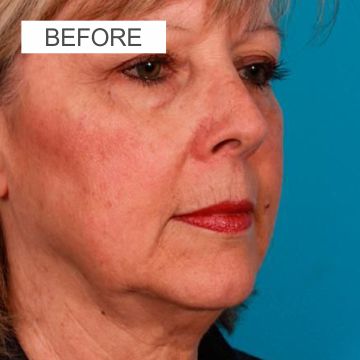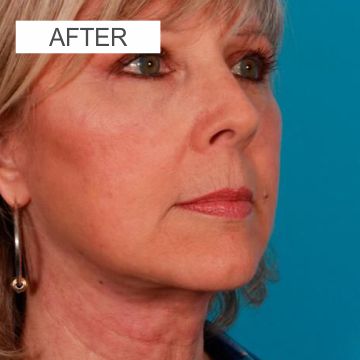What is Face Lift?
A FACELIFT is also known as rhytidectomy.
The surgery can vary from minimally invasive to more extensive and sophisticated surgery.
A facelift can help remove excess skin. It can also tighten the underlying tissues and muscle and redrape skin on the face as well as the neck.
Facial area under consideration
- Rhytidectomy mostly targets the lower facial areas like the jawline, jowls and cheeks but can also emphasize on the midface or the forehead area.
- In some cases, deeper facial tissues may be repositioned or tightened to attain a more youthful appearance.
- In other cases, removal or addition of fat or other soft-tissue fillers may be a requisite to obtain the best possible outcome.
- Currently, many different techniques are available with results that can be considered reliable, safe, and durable.
EMI Options Available from Bajaj Finserv

Who Needs It?/ Candidature For Facelift Surgery
Who is the best candidate for FACELIFT SURGERY?
A facelift is the most substantial approach to treat facial wrinkles and other telltale signs of aging.
Suitable candidate for a FACELIFT :
The need for FACELIFT :
-
If one feels that face has lost its youthfulness and charm.
-
Appearance of loosened skin on the midface and the jawline.
-
Deep creases developed from the nose to the corners of the mouth (also known as nasolabial folds)
-
Lines extending from each corner of the mouth down till the chin (called as marionette lines)
-
Displayed or fallen facial fat.
-
Sagging and loss of muscle tone in the lower face, eventually resulting in jowls.
-
Appearance of double chin, as a result of loose skin and excess fatty deposits under the chin and jaw.
-
Creasy and sagging skin of the neck.
Eligibility to undergo a FACELIFT :
Any of the above mentioned reasons makes you a suitable candidate to undergo facelift. But to be an eligible candidate for surgery you should also fulfill the following criteria:
-
Every surgical procedure including plastic or cosmetic surgery involves certain risks. You should undergo a FACELIFT SURGERY only if you have a medical requirement or you feel that the particular surgery will enhance your quality of life.
-
You shall be a good candidate for the FACELIFT SURGERY if you are healthy, you have realistic expectations from the outcome of the surgery and you are aware of all the risks associated with the procedure.
-
You cannot consider undergoing a cosmetic surgery if you have serious health issues like diabetes, heart diseases, high blood pressure, bleeding disorders like haemophilia or depression.
-
You shall not be a good candidate for the FACELIFT SURGERY if you smoke or drink too much alcohol.
-
You should have positive attitude!
-
You expectations from the outcome of the surgery should be realistic.
-
You should be ready to miss at least a few weeks of normal activity.
Benefits Of Facelift Surgery
A FACELIFT can rectify midface sagging, marionette lines, jowls also a double chin thus maintaining its stature as the ‘gold standard’ for facial rejuvenation.
Every year, thousands of people undergo successful facelift surgery and are pleased with the outcome.
Advantages of FACELIFT
- The biggest advantage of a FACELIFT surgery is it can enhance many areas of the face in one go.
- The outcome of the surgery can last for at least for ten years or more and can make one appear ten to fifteen years younger
- It can help recontour the neck and jawline better than all the other alternative methods.
PHYSICAL APPEARANCE:
YouthfulnessAgeing is a natural process which everyone goes through. Visible wrinkles, fine lines, blemishes are signs of ageing. Such skin flaws makes you look tired or aged. But with FACELIFT like suitable treatment one feels younger, healthier and rejuvenated.
Natural:Nowadays RHINOPLASTY is gaining immense popularity because it produces results that blend extremely well with a patient's facial aesthetics. Soon after the surgery, one gets back to the desired or normal shape of a treated body part. One does not have to wait long to see the result, which is the beauty of cosmetic surgery.
INCREASED CONFIDENCE AND ENHANCED MENTAL HEALTH:
Self Confidence is a tool that helps us face challenges and tackle problems in life, with great certainty. When you look good, you feel good which in turn increases your self confidence. It leads to greater willingness to try new things or open up in social situations. You become more willing and open to wearing certain clothes or participating in activities which you avoided prior to surgery, due to discomfort in your appearance.
Certain clinicians and psychologists feel, few corrections in your body parts, by cosmetic surgery can not only lead to emotional wellness but also enhanced mental health.
OTHER OPPORTUNITIES:
Studies do suggest that people that are more attractive benefit in their personal as well as professional lives.
Studies have also found, good looking people have a higher probability of getting promotions and making more salary.
A 2012 study published in Applied Financial Economics revealed that good looking real estate agents were able to sell properties at a higher price than agents that were average looking.
- A facelift surgery will not generate a ‘new’ you, just a younger version of yourself.
- There will be some recovery time associated with this procedure. No instant outcomes would be visible.
- Depending upon the age and skin type, there might be requirement of a secondary procedure after some time.
Disadvantages of FACELIFT :
If you wish to undergo a FACELIFT for specific goal or need, what is unique to you, please consult your aesthetic plastic surgeon.
Facelift Surgery Procedure
The procedure:
- The type of incisions made, will depend on the area of the face that is targeted and the amount of change expected from the outcome of surgery.
- Once the incisions are made, ‘undermining’ of the skin is performed, and the deeper layers of the face are lifted. Undermining helps separate the overlying skin of the face and neck from the muscles and tissues deep inside the skin. It also loosens the facial and neck skin which can be redraped, at the end of the procedure, making the skin look even and smooth.
- Then, the cosmetic surgeon will raise the skin from the temples, cheeks, neck, and lift and reposition the underlying connective tissue, by removing the excess fat and skin.
- Facial implants may be added to increase cheek or chin volume.
- Finally, the incisions are closed with sutures or small metal clips. If necessary, drainage tubes can also be inserted also if required, a padded, supportive dressing is applied.
- The procedure can be performed simultaneously with a neck lift.
- The main aim of an aesthetic plastic surgeon and the entire crew is to help you achieve the most desirable and natural-looking results, and to make the surgical experience as easy and comfortable as possible.
Types of FACELIFT :
1. Traditional facelift: A surgeon will perform incisions in the hairline at the temples, continuing down and around the front of the ears and hidden in the natural creases behind the ears till the lower hair-bearing scalp.
2. Limited-incision facelift: A surgeon will carry out short incisions in the hairline, starting from the temples and continuing down and around the front of the ears, hidden in the natural creases. There may also be incisions made, in the lower eyelids, temporal area, or under the upper lip.
3. Neck lift: The surgeon will accomplish incisions starting in front of the earlobes and continuing around behind the ears until the lower scalp. There can also be possibly, a small incision underneath the chin. Modified incisions include variations of the short scar with shorter incisions around the ear.
Facelift Surgery Alternatives
FACELIFT alternatives:
Excessive eyelid skin, dangling upper eyelids, and dropping eyebrows are commonly observed in the same patient. It is difficult to achieve a good aesthetic and proficient outcome unless all three problems are taken into consideration.
A cosmetic surgeon will evaluate the problem, considering the hairline and hair style preferences, and make a recommendation that will yield the least scarring and the best cosmetic results.
- The surgeon might suggest an endoscopic lift if you have mild to moderate brow droop and horizontal wrinkles.
- A coronal forehead lift will be considered as most appropriate if you have advanced brow droop with deep wrinkles.
- The surgeon will recommend a subcutaneous lift if you have a high forehead, to avoid raising the hairline further. In this procedure the incisions is made near the hairline, leaving visible scars that can be hidden with hair.
Associated Risks
Complications:
The potential for complications while performing surgery persist, just as for any other operation.
Pain is probably the most significant drawback of plastic surgery, and recovery times can be as long as six months in a few cases.
Some individuals may be at risk of severe reactions to anaesthesia or may develop health problems such as bleeding as a result of their surgery.
You need to discuss with Doctor regarding risks involved in the procedure.
Severe side effects:
Any surgical procedures carries a certain amount of risk, which may include excessive swelling, bruising or bleeding , wound becomes infected, delayed healing of wounds, numbness, breathing difficulties, unfavourable scarring, extrusion of implants or sutures, pain, and the need for revision of the surgery.
Worsened Self Image:
Cosmetic surgery is not necessarily a purely aesthetic choice few choose it out of low self esteem and depression. If this is the true intention behind the surgery, than you will most probably never feel better after surgery because the underlying problems will still be unresolved.
All in all, however, if complications are few and the benefits far outweigh the risks then Cosmetic Surgery is a procedure that can change your life for the better.
Preparing For Facelift Surgery
If you are considering FACELIFT SURGERY, it is important to take the time to determine why you want the surgery in the first place. If you have a medical need, or if you truly feel that reshaping your face will improve your quality of life, then you are a good candidate if you meet the aforementioned criteria.
While some people think that FACELIFT SURGERY is just a cosmetic procedure, it is in fact a medical procedure required for some people. FACELIFT SURGERY is done, not just to enhance your appearance but to also contribute to your overall health. Although having a FACELIFT SURGERY is common for Hollywood and bollywood celebrities and those who work in the limelight, certain life circumstances can force you to go under the knife. Here are some medically-necessary reasons that require you to have FACELIFT SURGERY.
Appropriate Consultation
- The most appropriate way to consider your competency for any kind of plastic surgery is to schedule an appointment with a proficient surgeon.
- During the first encounter the doctor will try to understand why you feel the need to have a surgery and also what are your expectations from the outcome of the surgery.
- The physician will evaluate your medical history; inquire about your current medication and medical condition. He should also be aware of everything you take, including vitamin supplements or herbal products since they might interfere with other medicines used during surgery. The surgeon might ask you to perform blood tests and a few general lab tests to monitor your current health status.
- The surgeon will perform a physical exam, to have a close look at the skin, associated muscles and bones, their quality and the kind of changes that can be made. Surgeon might also suggest an additional surgery which will enhance or compliment your look,
- and last but not the least; the physician will assess your mental fitness to check whether you are ready to undergo the surgery.
RECOVERY TIME
- Recovery is basically the time required to get back to a relatively normal routine.
- Patients who wish to undergo FACELIFT SURGERY must plan for time off to heal and to be comfortable being seen in public.
- The healing time can vary from person to person and will also depend on the type of surgery to be performed.
- It can take up to two three weeks to return to work and perform everyday activities. After consulting with the doctor, People can utilise this time to go on a vacation or nurture themselves.
THE OUTCOME:
- Sometimes the FACELIFT SURGERY doesn't produce the results the patient imagines. This gap between imagination and reality may frustrate patient.
- Expecting unrealistic results, like the surgery will make you look like a Hollywood or Bollywood star and automatically solve all of your problems, can be a significant drawback to having cosmetic procedures.
- To have a better experience, it is extremely important to consult a qualified doctor before planning the surgery and develop a rational idea of what the end result will look like.
After Effects Of Surgery
- Pain:
- Swelling:
- Discoloration
- Numbness
- Bleeding
- Depression
There are chances of having mild to moderate pain and discomfort post surgery. The pain can be easily regulated with oral medications.
The distress and pain should reduce within 72 hours after surgery. A reasonable increase in pain post 72 hours should prompt you to contact the doctor.
Swelling can differ from patient to patient. It might increase during first three to four days before subsiding.
Things that can be done to reduce swelling include keeping the head elevated as much as possible; avoid bending over or lifting heavy objects.
Prolonged sun exposure should also be avoided for the initial two to three months.
Most bruising and discoloration resolve within the first two to three weeks. Make up can be applied to cover up the discolouration when been seen in public.
The body part that undergoes the surgery can be numb for few days. The feeling of numbness is normal and shall reduce over upcoming weeks. Unusual sensations and moderate discomfort can persist while the nerves are regenerating over time.
Sometimes bleeding can occur, post surgery. You can lie down with your head elevated but if the bleeding still persists at this point, it would be advisable to consult your doctor.
It is perfectly alright for patients to go through a period of mild depression after the cosmetic surgery as after some days or weeks which depends on surgery, patients generally becomes anxious and expects the results when swelling and bruising still persists. But the patient should realize that it is a temporary condition and things are bound to improve over a period of time.
Post Surgery Do's And Don'ts
Ask your doctor. for better and suitable guidelines. Following are the general instructions which should help you get the best results from your surgery.
Post Surgery do’s and don’ts:
- No vigorous exercise, contact sports and running for minimum of two weeks.
- No lifting heavy objects for at least 3 weeks.
- Avoid pullover clothing for two weeks especially if you have undergone a face surgery.
- Bypass hard chewing foods for a few days.
- Avoid yawning and wide mouth opening for two to three weeks.
- Avoid nose blowing or sniffing through the nose especially after rhinoplasty or nose job.
- Avoid driving a vehicle for a few days after surgery.
- No swimming for at least two weeks after surgery.
- Avoid laughing, smiling, or other facial expressions that need a lot of movement.
- Use a soft bristle toothbrush to brush your teeth.
- Prefer using a mild soap and shampoo while taking a shower.
It is essential to maintain the tape and cover on the surgery to keep it dry. Once the doctor advises to remove the tape you can to gently wash your surgery area twice a day to help reduce oiliness.
You should be prompt enough to contact the doctor immediately, for any signs of bleeding that persist for more than ten minutes, infections, redness, swelling, fever, pain etc.
Exercising After Facelift
After cosmetic surgery many patients asks about post surgery exercise or when can they resume their gym activity. Patients needs to understand that, its extremely crucial to give enough time for proper healing of your body, for eg strain on muscles, excessive sweating, stretching of the skin etc. can delay the recovery.
You need to consult your doctor about
-
How soon you can start exercising?
-
What type of exercise?
-
How much time?
Don't start exercise without asking your doctor and follow guidelines given by your doctor as for complete healing, body needs time, and you need enough energy level for your routine and gym.
Seek Medical Help
CALL THE OFFICE PROMPTLY IF YOU NOTICE ANY OF THE FOLLOWING:
-
Development of a temperature elevation exceeding 100 degrees.
-
An unusual amount of bleeding from the surgery area
-
Significant reinjury of the surgery area
-
A significant increase in pain even after taking your prescribed medication
In such situations, we expect you to call to the clinic even after office hour, Please do not hesitate to call us or present yourself to the emergency section of the clinic for evaluation.
Finally
Patients who wish to undergo a cosmetic surgery must plan for time off to heal and to be comfortable being seen in public. The healing time can vary from person to person and will also depend on the type of surgery to be performed and the results are worth the wait. Swelling remains for four to six weeks and healing process may continue for the first year. I will follow you through this entire process, but you need to keep patience. Please do not hesitate to ever contact our office.
For any queries regarding Face Lift please contact
Dr. Salil Patil
Facial Cosmetics Surgery
Dhanwantari's Chrysalis
Third Floor,Bhondve Corner building,
Ravet-D.Y.Patil College Road,Ravet
Pune-412101
Call Us: +91 89802 08978
Enquire Us Today
Our Medical Team
Our medical team comprises highly accomplished and dedicated doctors,nurses,physicians. Our doctors prepares personalized treatment plans considering patient’s persona which truly integrates whole person.
Cost
Since the recommended cosmetic surgery will differ from person to person, the overall cost of treatment can also vary depending on numerous factors.
Patients should discuss the total cost of surgery with their surgeons.
Cosmetic surgery is generally not covered by any medical insurance. However, once in a while, if there is a medical condition related to the surgery, there can be some form of insurance compensation available.
Mostly medical insurance is provided to surgeries used to repair birth defects, reconstructive surgery after an accident or severe burns etc.
Medical Finance Services
Most of the time cosmetic surgeries are not covered by medical insurance unless the problem is medical. In such cases ask our staff whether any finance is available for certain surgeries. If finance is available you need to fill the form with some required and documents.





